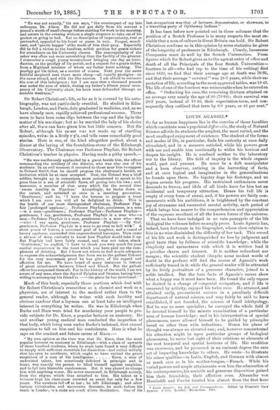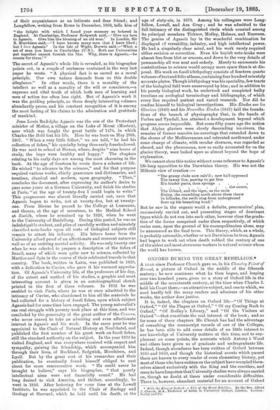LOUIS AG1SSIZ.*
So far as human happiness lies in the exercise of those faculties which constitute man's psychical differezdia, the study of Natural Science affords its students the amplest, the most varied, and the most unalloyed enjoyment of existence. The student of the forms and modes of life, in particular, finds his curiosity at once daily stimulated, and in a measure satisfied, while his powers grow with use and enable him continually to widen his horizon and deepen his insight. He is confined neither to the laboratory nor to the library. His field of inquiry is the whole organic world, past and present. He must be a deft manipulator and a keen observer, untiring in the harvesting of facts, and at once logical and imaginative in the generalisations he founds upon them. No bigotry dogs his footsteps, and no dogma arrests his progress. His restrained enthusiasm never descends to frenzy, and idols of all kinds have for him but an incidental and temporary attraction. Hence his full life is empty of every form of ennui, and, if his powers are fairly com. mensurate with his ambitions, it is brightened by the constant joy of strenuous and successful mental activity, each period of which brings him nearer to the comprehension and appreciation of the supreme resultant of all the known forces of the universe.
That we have here indulged in no vain panegyric of the life biological the volumes before us amply prove. Louis Agassiz has, indeed, been fortunate in his biographer, whose close relation to him in no wise diminished the difficulty of her task. This record of his life and work is distinguished no less by judgment and good taste than by fullness of scientific knowledge ; while the simplicity and earnestness with which it is written lend it a peculiar charm and interest. It is neither redundant nor meagre ; the scientific student (despite some modest words of doubt in the preface) will find the course of Agassiz's work sufficiently traced in it, while the general reader will be attracted by its lively portraiture of a generous character, joined to a noble intellect. But the bare facts of Agassiz's career show what a happy one it must have been. He found the only repose he desired in a change of congenial occupation, and if life is measured by activity, enjoyed his twice over. He attained, and attained early, pre-eminent success in a peculiarly difficult department of natural science, and may fairly be said to have established, if not founded, the science of fossil ichthyology. But he was no mere specialist ; he surveyed the whole field if he devoted himself to the minute examination of a particular area of human knowledge ; and in his interpretation of special phenomena, never allowed himself to be guided by principles based on other than wide inductions. Hence his plane of thought was always an elevated one ; and, however concentrated his attention might be upon particular groups of biological phenomena, he never lost sight of their relations as elements of the vast temporal and spatial horizons of life. His erudition was enormous, and he possessed in an eminent degree the rare art of imparting knowledge to others. He wrote—to illustrate his minor qualities—in Latin, English, and German with almost as much ease as in his mother-tongue,—French. While his varied powers and ample attainments won him the admiration of his contemporaries, his amiable and generous disposition gained him their friendship, their affection even. Alexander von Humboldt and Cnvier treated him almost from the first hour • Louis dgassiz : his Life and Correspondence. Edited by Elizabeth Cary Agassiz. 2 vole. London: Macmillan. 188).
of their acquaintance as an intimate and dear friend ; and Longfellow, writing from Rome in December, 1868, tells him of
" the delight with which I found your memory so beloved in England. At Cambridge, Professor Sedgwick said,' Give my love to Agassiz. Give him the blessing of an old man.' In London, Sir R. Murchison said,—' I have known many men that I have liked ; but I love Agassiz' In the Isle of Wight, Darwin said.—' What a set of men you have in Cambridge (U.S.). Both our Universities put together oannot furnish the like. Why, there is Agassiz,—he counts for three.' "
The secret of Agassiz's whole life is revealed, as his biographer points out, in a couple of sentences contained in the very last paper he wrote. "A physical fact is as sacred as a moral principle. Our own nature demands from us this double allegiance." In other words, there is a morality of the intellect as well as a morality of the will or conscience,—a supreme and vital truth of which both men of learning and men of action too often lose sight. But of Agassiz's work it was the guiding principle, as these deeply interesting volumes abundantly prove, and his constant recognition of it is among the most lasting of his claims to the admiration and gratitude of mankind.
Jean Louis Rodolphe Agassiz was the son of the Protestant minister of Motier, a village on the Lake of Morat (Morten), near which was fought the great battle of 1476, in which Charles the Bold lost his life. Here he was born on May 28th, 1807. " When a very little fellow," we are told, " he had his collection of fishes," his specialty being thus early foreshadowed.
He was sent to school at Bienne, where, despite " nine hours of study, the boys were healthy and happy." The chapters relating to his early days are among the most charming in the book. At the age of fourteen he wrote down a scheme of life.
He wished " to advance in the sciences," and for that purpose required various works, chiefly grammars and dictionaries, and
treatises, classical and modern, upon geography. " Then," concludes the document, after expressing its author's desire to pass some years at a German University, and finish his studies at Paris," at the age of twenty-five I could begin to write." This programme was almost literally carried out, save that
Agassiz began to write, not at twenty-five, but at twenty- one. From Bienne he passed to the College at Lausanne,
and thence, at the age of seventeen, to the Medical School at Zurich, where he remained up to 1826, when he went
to the University of Heidelberg. During this period, he was an indefatigable student, and piles of carefully written and minutely classified note-books upon all sorts of biological subjects still remain to attest his industry. His letters home from the University afford proof of an affectionate and reverent nature as well as of an untiring mental activity. He was only twenty-one when he was selected to prepare a description of the fishes of Brazil, many of which were quite new to science, collected by Martins and Spix in the course of their celebrated travels in that country. The book, written in Latin, was published in 1829, with a dedication to Cuvier, who gave it his warmest approba- tion. Of Agassiz's University life, of the professors of his day, of the extent and method of his studies, a graphic and most interesting account is given in an autobiographical sketch printed in the first of these volumes. In 1832 he was enabled to visit Paris, where he was at once admitted to the intimacy of Cavier, who abandoned to him all the materials he had collected for a history of fossil fishes, upon which subject Agassiz had for some time been engaged. The young naturalist's
one real struggle with poverty took place at this time, and was concluded by the generosity of the great author of the Cosmos,
who never ceased to take an admiring and even affectionate interest in Agassiz and his work. In the same year he was appointed to the Chair of Natural History at Neufchatel, and published the first number of his great work on fossil fishes, still the standard authority on the subject. In the year 1834 he visited England, and was everywhere received with respect and sympathy, gaining the friendship, which accompanied him through their lives, of Bnckland, Sedgwick, Murchison, and Lyell. But by the great cost of his researches and their publication, he eventually found himself obliged to cast about for more remunerative work. " Ha could never be brought to believe," says his biographer, " that purely intellectual aims were not financially sound." He had long desired to visit America, and thither, accordingly, he
went in 1846. After lecturing for some time at the Lowell Institute, he was appointed to the Chair of Zoology and Geology at Harvard, which he held until his death, at the age of sixty-six, in 1873. Among hie colleagues were Long. fellow, Lowell, and Asa Gray ; and he was admitted to the fall intimacy of the distinguished circle which counted among its principal members Ticknor, Motley, Holmes, and Emerson. The genius of Agassiz lay in the wonderful combination he displayed of versatility, industry, and high intellectual power.
He had a singularly clear mind, and his work rarely required either revision or correction. Even his boyish note-books were almost free from blot or erasure, and down to the very details of penmanship all was neat and orderly. Merely to enumerate his contributions to science would occupy more space than is at dis- posal. His work on fossil ichthyology consists of fourteen quarto volumes of text and folio atlases, containing four hundred minutely accurate plates. Though ichthyology was his speciality, few tracts of the biological field were onsurveyed by him ; and in addition to his purely biological work, he undertook and completed bulky treatises on zoological terminology and bibliography, of which every line required patient and varied research. Nor did he
confine himself to biological investigations. His Etudes sur les Glaciers (1840) and his Nouvelles 'tulles (1847) laid the founda-
tions of the branch of physiography that, in the hands of Forbes and Tyndall, has attained a development beyond which progress seems impossible. But some fifty years ago the notion that Alpine glaciers were slowly descending ice-rivers, the remains of former massive ice-coverings that extended down to the shores of the Mediterranean and retreated northward, under some change of climate, with secular slowness, was regarded as absurd, and the phenomena, now so easily accounted for on the glacier theory, were looked upon as almost beyond the hope of explanation.
We cannot close this notice without some reference to Agassiz's life-long opposition to the Darwinian theory. His was not the Miltonic view of creation :—
" The grassy clods now calv'd ; now half-appeared The tawny lion, pawing to get free
His hinder parts, then springs . . . .
the ounce, The libbard, and the tiger, as the mole Rising, the crumbling earth above them threw In hillocks, the swift stag from underground Bore up his branching head."
But he saw in the organic world a definite, preconceive. plan, successively carried out, and presenting stages of dominant types which do not run into each other, however close the grada- tion of the forms comprised under them respectively, of which series man, upon the ground of his cosmopolitanism alone, may be announced as the final term. This theory, which, as a whole, is probably untenable, whether or not Darwinism be true, Agassiz had begun to work out when death robbed the century of one of the ablest and most strenuous workers in natural science whom the world has known.











































 Previous page
Previous page